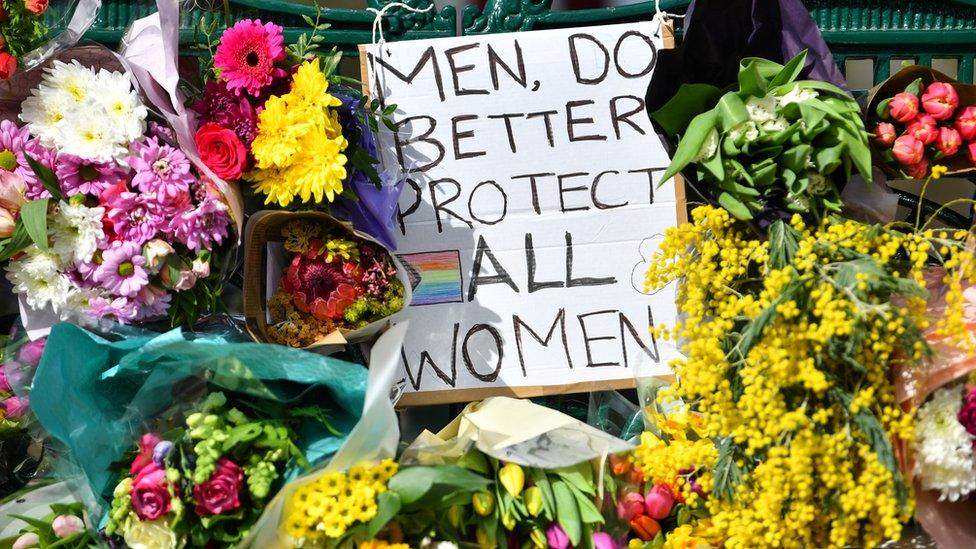Sarah Everard was a wholly blameless victim, court hears
- Published

The body of Sarah Everard was found hidden in woodland
Sarah Everard was a "wholly blameless victim of a grotesque series of circumstances", a judge has said.
Wayne Couzens, a Met Police officer, strangled Ms Everard with his police belt after kidnapping her during a false arrest.
Couzens showed his warrant card before restraining the 33-year-old, putting her in his hire car and driving away.
Lord Justice Fulford said he had "no doubt Couzens used his position as a police officer to coerce her into car".
Ahead of sentencing Couzens, external, the judge said the circumstances of the case were "devastating, tragic and wholly brutal".
The evidence gathered against him was "unanswerable" and there was "no credible innocent explanation" for it, he said.
The judge added that Couzens went "hunting a lone female to kidnap and rape" having planned his actions in "unspeakably" grim detail.
The defendant's preparations included taking some of his police kit with him and lying to his family about working on the night of the murder, he said.
A CCTV timeline shows key evidence used to arrest and prosecute Wayne Couzens
Prosecutor Tom Little QC previously suggested the case was so exceptional and unprecedented that it could warrant a whole life order, meaning Couzens would die in jail.
During mitigation earlier, defence barrister Jim Sturman QC said his client was filled with "self-loathing".
He told the Old Bailey that nothing he said was intended to minimise the "horror" of what Couzens did that night and after, but he argued against a whole-life order.
"He accepts he will receive and deserves severe punishment," Mr Sturman said,
"No right-minded person... can feel anything other than revulsion for what he did."
The barrister claimed that Couzens should not be sentenced to a whole-life order on three grounds: his guilty pleas, underlying depression and that he has no previous convictions for violence.
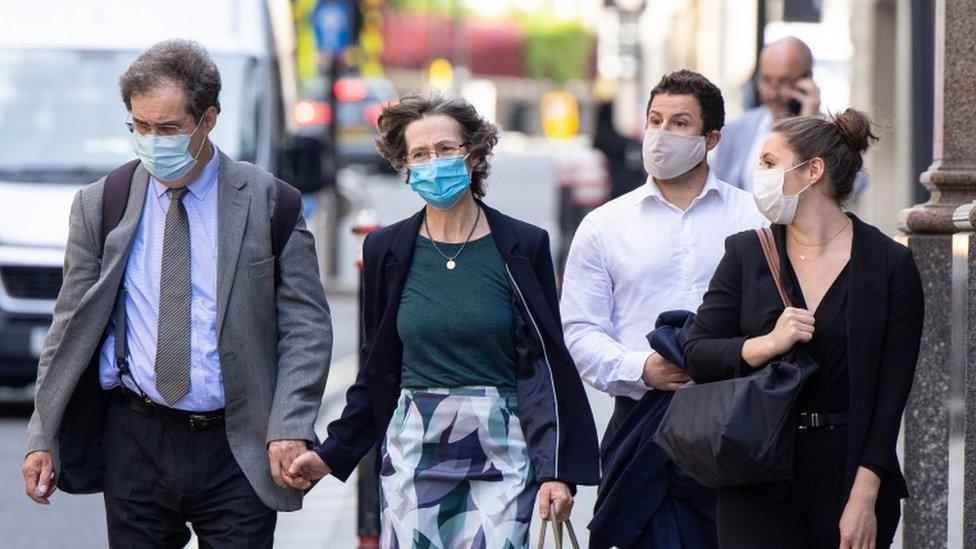
Ms Everard's family was in court for Couzens' guilty plea
Ms Everard's family previously said there can be "no redemption for what he had done".
The defendant was not able to look at the family during the hearing.
Mr Sturman added: "He is ashamed. What he has done is terrible and he deserves a very lengthy finite term.
"But he did all he could after he was arrested to minimise the wicked harm that he did."

Lucy Manning, BBC special correspondent, from the Old Bailey:
Wayne Couzens walked into the dock, bent over, again looking down at the floor.
After the emotion of Wednesday when he was made to look up and face the Everard family as they described the impact of losing Sarah, he will find out today if he will spend the rest of his life in jail.
The Everard family are in court to hear what sentence he will receive.
As Couzens' barrister told the court that the policeman doesn't seek to make excuses for anything that he'd done and he is filled with self loathing and abject shame, Sarah Everard's mother stared at her daughter's murderer. He never looked up.
As they said yesterday, all they want is Sarah back and no punishment he receives will ever compare to the pain and torture Couzens inflicted on them.

Couzens' two-day sentencing hearing, which started on Wednesday, heard that Ms Everard's ordeal could be summarised as "deception, kidnap, rape, strangulation, fire".
The firearms officer, who had clocked off from a 12-hour shift at the American embassy that morning, drove to a secluded rural area near Dover in Kent, where he parked up and raped Ms Everard.
The marketing executive, who lived in Brixton, south London, had been strangled by 02:30 GMT the following morning, the Old Bailey heard.
Couzens burned her body in a refrigerator in an area of woodland he owned in Hoads Wood, near Ashford, before dumping her remains in a nearby pond.
He was arrested at his home in Deal, Kent, after police connected him to a hire car he used to abduct Ms Everard, whose remains were found by police dogs on 10 March.
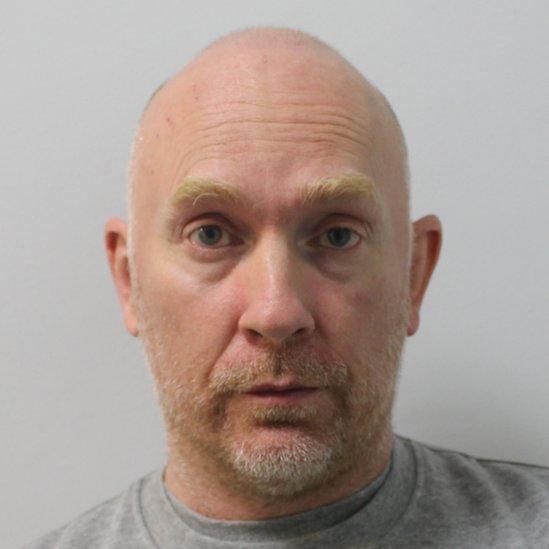
Couzens' defence barrister said his client was filled with "self-loathing"
A whole-life order means the criminal is in prison for the rest of their life without ever becoming eligible for parole.
It differs from a life sentence, under which the prisoner is given a number of years they must spend in jail after which they will be eligible to apply for parole.
Whole-life tariffs are reserved for offenders judged to be the most dangerous to society.
Related topics
- Published29 September 2021

- Published29 September 2021
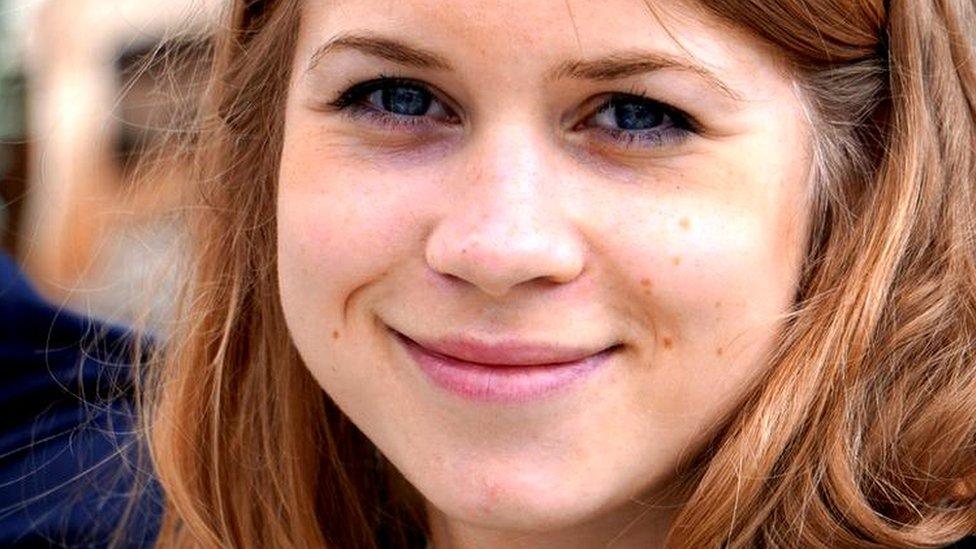
- Published9 July 2021
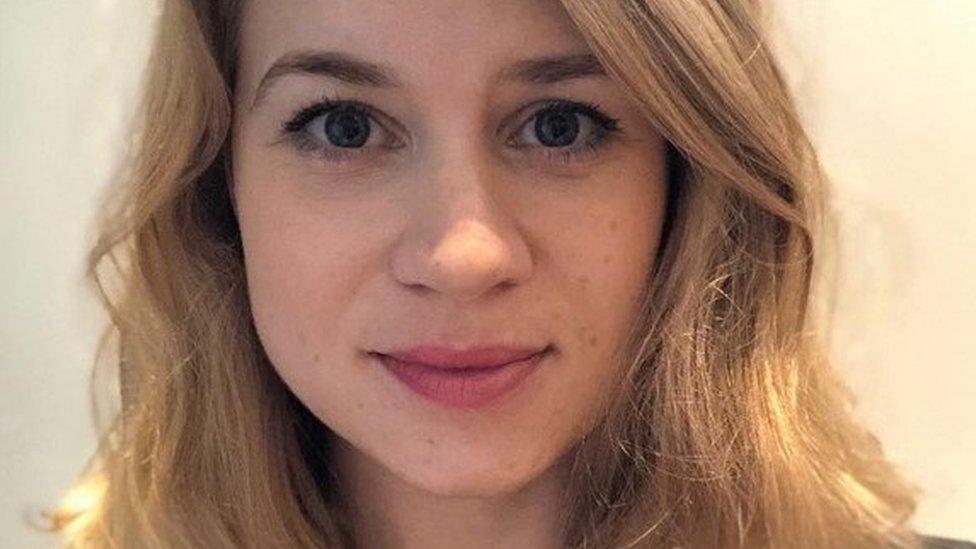
- Published8 June 2021

- Published14 March 2021
